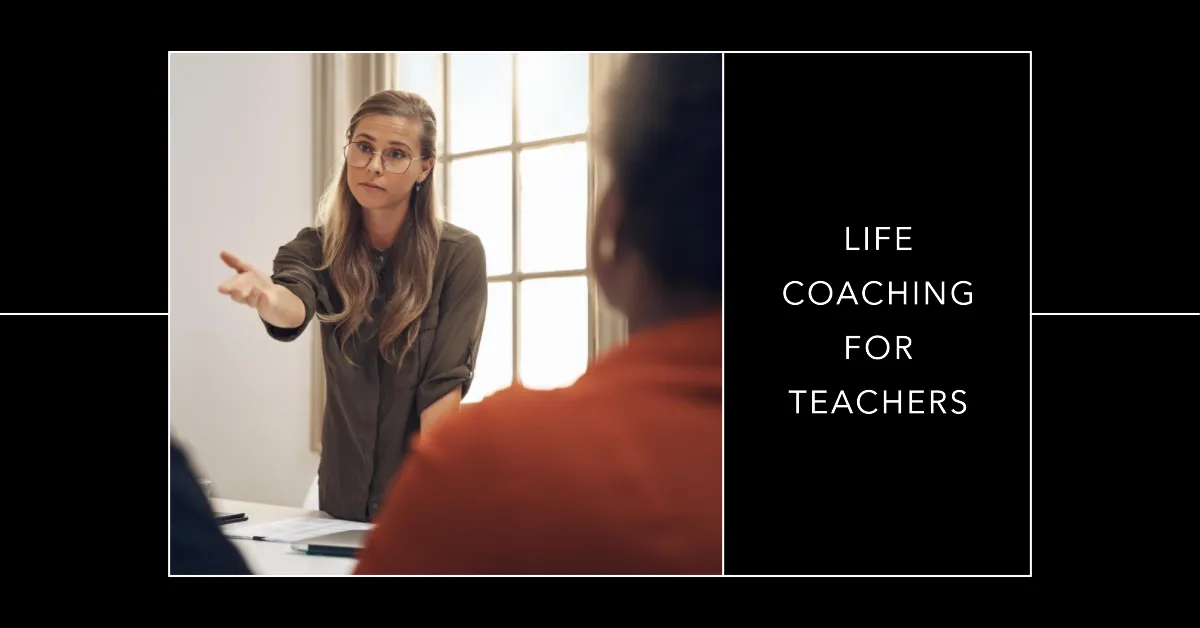Teaching can be like trying to navigate a ship through rough waters. The seas are unpredictable, and the waves can come crashing down at any moment. But just like a captain needs help from their crew, teachers also need support to weather the storms of education. This is where life coaching comes in – it’s like having a compass that helps you chart your course and stay on track.
As a teacher, you have an important role in shaping young minds and preparing them for their future. But this job can also take a toll on your mental health, leaving you feeling burnt out and overwhelmed. This is why self-care is crucial for teachers, and life coaching can be a powerful tool to help you prioritize your wellbeing while still being an effective educator. By investing in yourself through life coaching, you’ll not only improve your own quality of life but also create a positive ripple effect in the lives of your students and colleagues.
Table of Contents
Key Takeaways
- Life coaching can benefit teachers by improving communication skills, enhancing time-management and organization skills, managing stress, and increasing job satisfaction and a sense of purpose.
- Finding the right life coach is important, and teachers should consider coaching style, availability, and personal compatibility when choosing.
- Life coaching can help teachers set boundaries, communicate effectively, manage time better, and reduce stress levels through mindfulness techniques or other methods like exercise or meditation practices.
- Investing in life coaching is an investment that pays dividends long after the sessions have ended, and can lead to greater fulfillment in all areas of life.
The Importance of Self-Care for Teachers
Teachers need to prioritize self-care because neglecting it can lead to burnout and negatively impact their overall wellbeing. As a teacher, you have a lot on your plate; lesson planning, grading papers, managing the classroom, and dealing with students’ needs. It’s easy to lose track of your own health when you’re constantly putting others first. However, taking care of yourself is essential if you want to perform at your best in the long run.
When you don’t take care of yourself, stress can build up quickly. This constant state of tension can lead to physical symptoms such as headaches or stomach problems. You may also experience emotional symptoms such as irritability, mood swings, or even depression. Furthermore, chronic stress can weaken your immune system making you more prone to illnesses.
Taking time for self-care doesn’t mean that you have to spend hours at the spa or go on extravagant vacations. It simply means finding ways to incorporate small acts of self-love into your daily routine. For example, waking up 10 minutes earlier than usual and doing some yoga stretches before starting your day can help improve your mood and energy levels throughout the day.
Prioritizing self-care is crucial for teachers who want to avoid burnout and maintain their overall wellbeing. By taking small steps toward self-love every day, you’ll be able to show up for yourself and your students with renewed energy and passion for teaching. Remember that taking care of yourself isn’t selfish; it’s necessary for both personal growth and professional success in the classroom!
What is Life Coaching?

If you’re looking to improve your personal and professional life, life coaching might be just what you need. Life coaching is a process that helps individuals identify their goals and create actionable plans to achieve them. As a teacher, working with a life coach can help you develop new skills, overcome challenges, and ultimately become the best version of yourself both in and out of the classroom.
Definition and Benefits
Imagine being more confident and fulfilled in your career as a teacher – that’s just one of the benefits of life coaching. Life coaching is a process where a coach works with you to identify your goals, create an action plan, and provide support and guidance along the way. As a teacher, you can benefit from life coaching in many ways:
- Clarify your vision for your teaching career;
- Improve communication skills with students, parents, and colleagues;
- Enhance time-management and organization skills;
- Manage stress and avoid burnout;
- Increase job satisfaction and sense of purpose.
By working with a life coach who specializes in supporting teachers, you can gain clarity on what matters most to you in your teaching career. You’ll learn how to set boundaries, communicate effectively with others, manage your time better, reduce stress levels through mindfulness techniques or other methods like exercise or meditation practices. With all these benefits at hand, it’s no wonder why so many teachers have already started seeking out life coaches to help them achieve their full potential as educators!
The Role of a Life Coach for Teachers
As you seek to enhance your teaching career, a skilled coach can provide personalized guidance and support to help you achieve your goals. The role of a life coach for teachers is not limited to improving your professional skills or classroom management techniques. A good coach can also help you identify and overcome personal obstacles that may be hindering your progress.
A life coach can assist you in developing self-awareness, identifying limiting beliefs, and creating an action plan to achieve your desired outcomes. They can serve as a sounding board for ideas, offer constructive feedback, and provide accountability to ensure that you follow through with the steps necessary for success. By working with a life coach, you can gain clarity on what truly matters to you as an educator and create a fulfilling career path that aligns with your values and passions.
How Life Coaching Can Help Teachers
You’ll be amazed at how life coaching can help teachers overcome their challenges and achieve their goals, just like a ray of sunshine breaking through the clouds on a rainy day. As a teacher, you face many obstacles in your career that can leave you feeling overwhelmed and burnt out. Life coaching provides you with the support and guidance you need to navigate these challenges and find new ways to thrive in your role.
One way that life coaching can help teachers is by providing them with personalized goal-setting strategies. A life coach will work with you to identify your unique strengths, weaknesses, and aspirations. They’ll then develop a plan that aligns with your values and helps you achieve your objectives. This approach ensures that every step you take toward achieving your goals is intentional and meaningful.
Another benefit of life coaching for teachers is improved self-awareness. Through regular sessions with a coach, you’ll gain insight into your emotions, thoughts, and behaviors. This heightened awareness allows you to recognize patterns of behavior or thinking that may be holding you back from reaching your full potential as an educator. With this newfound knowledge, you’ll be able to make positive changes in both your personal and professional life.
Life coaching can provide teachers with valuable accountability measures to keep them on track toward their goals. When working alone, it’s easy to become distracted or discouraged by setbacks along the way. However, having someone who holds you accountable for making progress toward your objectives can provide the motivation needed to stay focused on what truly matters- improving student outcomes.
In summary, life coaching offers numerous benefits for educators seeking support in overcoming challenges and achieving their goals. By providing personalized goal-setting strategies, increased self-awareness, and accountability measures; coaches empower teachers to realize their full potential both inside and outside of the classroom.
Finding the Right Life Coach
Don’t settle for just any coach – finding the right person to guide you on your journey toward success and fulfillment can make all the difference in the world. You want someone who understands your unique challenges as a teacher, and who has experience helping others in similar situations. Look for coaches who have worked with educators before, or who specialize in coaching professionals.
It’s also important to consider their coaching style. Do they take a more direct approach, giving you specific steps to follow? Or do they help you uncover your own answers through questioning and reflection? Think about what resonates with you and what will help you achieve your goals.
Another factor to consider is their availability. Can they work around your teaching schedule? Are they accessible outside of scheduled sessions if needed? Make sure their availability aligns with yours so that you can get the support you need when you need it.
Lastly, trust your gut. If something feels off or doesn’t resonate with you, don’t ignore those feelings. Coaching is a personal relationship, so it’s important to find someone who not only has the expertise but also clicks with your personality and values. When you find the right coach, they can help unlock your potential and bring greater joy to both your personal and professional life as a teacher.
Tips for a Successful Coaching Experience
Now that you have found the right life coach for you, it’s time to start preparing for your coaching experience. Here are some tips to help ensure a successful coaching journey:
First and foremost, be open-minded. Life coaching is all about self-discovery and growth, so it’s important to approach each session with an open mind and a willingness to learn. Don’t be afraid to challenge yourself or step outside of your comfort zone.
Secondly, set clear goals. Before starting your coaching sessions, take some time to think about what you want to achieve through coaching. Whether it’s improving your work-life balance or building better relationships with colleagues, having clear goals will help keep you focused and motivated throughout the process.
Thirdly, communicate openly with your coach. Your coach is there to support you and help guide you toward achieving your goals. Be honest and transparent about what’s working well and what isn’t, as this will allow your coach to tailor their approach accordingly.
Lastly, track your progress. Keeping track of your progress can be incredibly motivating and empowering. Consider using a journal or creating a visual representation of how far you’ve come toward achieving each goal.
To further illustrate these tips, here is a table outlining some key actions that can contribute toward a successful coaching experience:
| Tip | Action |
|---|---|
| Be open-minded | Listen actively during sessions |
| Set clear goals | Write down specific objectives for each session |
| Communicate openly with the coach | Share any challenges or obstacles faced |
| Track progress | Keep a record of achievements |
Remember that life coaching is an investment in yourself – one that has the potential to bring about positive change in all aspects of your life! By following these tips and staying committed to the process, you’ll be well on your way toward achieving the personal and professional growth you desire.
Investing in Yourself as a Teacher

As a teacher, investing in yourself is crucial for your long-term success and happiness. Life coaching can provide valuable support to help you reach your goals and overcome obstacles that may be holding you back. By making life coaching a priority, you are taking proactive steps toward improving yourself both personally and professionally, which can lead to greater fulfillment in all areas of your life.
Long-Term Benefits
Over time, the positive effects of life coaching for teachers become like a ripple effect, spreading beyond the classroom and into every aspect of their lives. As you invest in yourself through life coaching, you will gain valuable skills that will not only improve your teaching but also enhance your personal relationships and everyday interactions. You’ll learn how to communicate more effectively, set goals and priorities, manage your time efficiently, and maintain a work-life balance.
Moreover, as you grow personally and professionally through life coaching, you’ll notice improvements in your mental wellbeing and self-confidence. You’ll be better equipped to handle the stressors that come with being a teacher and feel more fulfilled in all areas of your life. Ultimately, investing in yourself through life coaching is an investment that will continue to pay dividends long after the sessions have ended.
Making Life Coaching a Priority
Don’t let your own personal growth and wellbeing take a backseat in the midst of your busy teaching schedule. Making life coaching a priority can provide you with the tools to balance work and personal life, reduce stress, and improve overall happiness.
To make life coaching a priority, start by setting aside time each week for self-reflection and goal-setting. This could include journaling, meditation, or simply taking a walk outside to clear your mind. Additionally, seek out a qualified life coach who can help you identify areas of personal growth and provide guidance on how to achieve your goals. Remember that investing in yourself not only benefits you but also positively impacts those around you – including your students. By taking care of yourself first, you will be better equipped to show up as the best version of yourself in all aspects of your life.




